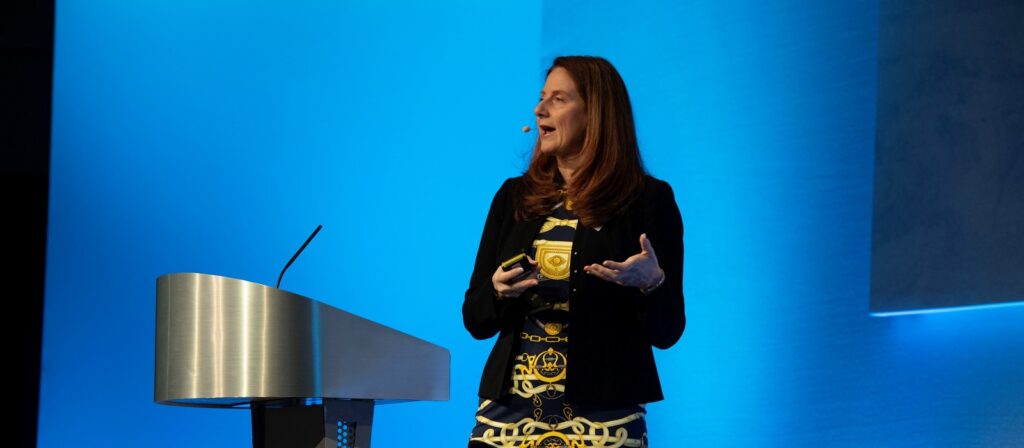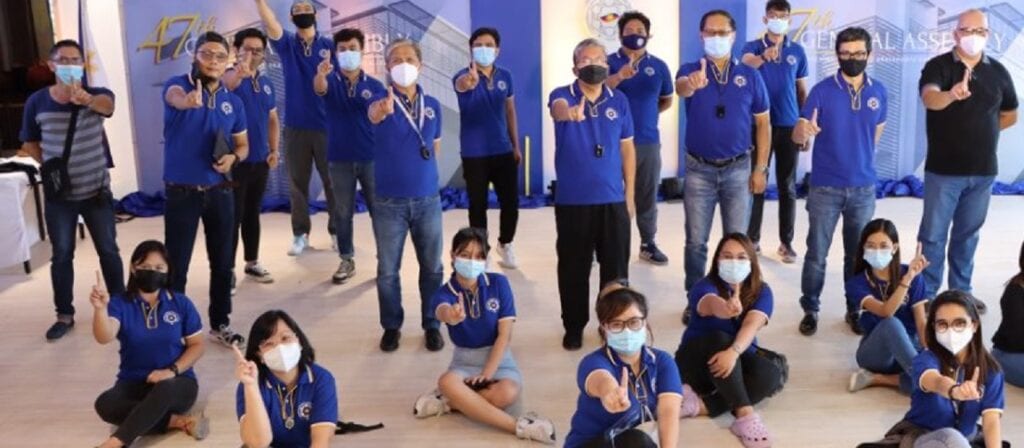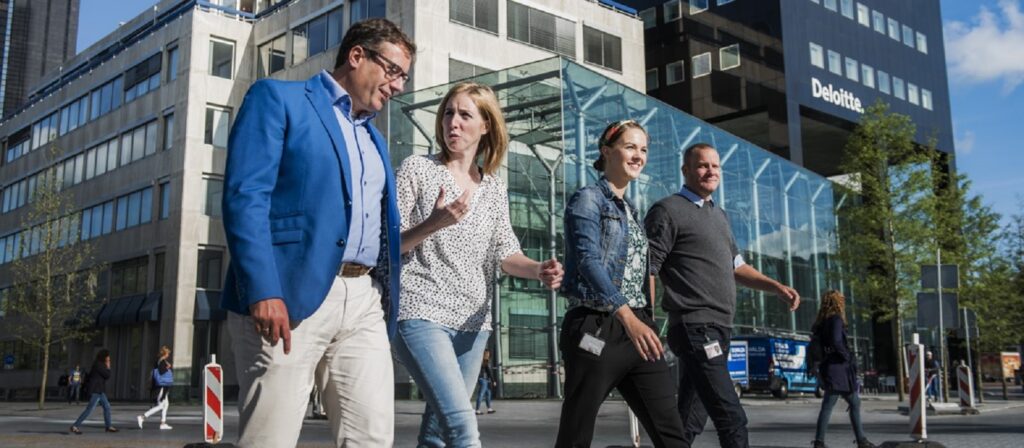Transforming operating models and the workforce given the challenges associated with the pandemic
Beneva (Canada) is the result of a “merger of equals” between mutual insurers La Capitale and SSQ. Beneva has around 5,000 employees and 3.5 million members; but it likes to think of itself as a start up with 75 years of experience and knowledge. The merger gave the organisation an opportunity to build a coherent experience from scratch when the merged company started in July 2020. It conducted surveys and focus groups to build the purpose and culture of the organisation with a “mutualistic ambience”. The purpose of Beneva is “people looking after people”, and the name of Beneva itself means “it’s going to get better”. Beneva is obsessed with culture: the company’s work culture statement includes words like “together”, “benevolence”, “care”, “performance”, “future-driven” and “member-oriented”. Employees feel engaged and motivated, and the company uses weekly surveys to help to keep and attract the right talent for the future of the organisation.
Onderlinge ‘s-Gravenhage moved into a new building just before the pandemic and with the movement it changed the cultural fabric of the organisation. It has moved everything to the cloud, stopped using paper, started using Teams for collaboration, and replaced telephones with data calling. The company was able to switch to working from home in one day because for 10 years it had already been quite common in the Netherlands for people to work two or three days from home. It is harder now getting people back to the office but it will see what happens after this autumn and winter. High energy bills could be a new opportunity to bring people back to the office instead of working from home.
A four-day working week?
1CISP (Philippines) experimented with a four-day work week before the pandemic, but the company was not ready digitally at that time so it did not work out. Despite having difficulties digitally, it was able to surpass the pandemic by listening to its teams and creating processes based on what it heard from its people. The company build its people so they can build their organisation.
At Beneva, a four-day work week is possible within its flexible working policies, but it is the choice of each employee. The company has chosen this very liberal approach to hybrid work based on surveys and focus groups. There are a few reasons why it is better for people to be together in the office, otherwise everyone is welcome to work from home (WFH) if they prefer that. Beneva felt that this very liberal approach was the best way to allow people to balance work and home life.
As HR leaders, what keeps you up at night?
In a question posed to the delegates at the ICMIF Conference, on what was keeping them up at night: 61% chose talent acquisition and retention, with 21% choosing upskilling current workforce and 18% opting for technology.
Talent is a big issue in the Netherlands but Onderlinge ‘s-Gravenhage is more relaxed about it. There is a recession coming up, so the country may see less movement in such circumstances. Also, upskilling the current workforce is an opportunity for talent retention. If the company wants to achieve all its goals, it needs to turn it into action. Businesses are run by people, so it needs to upskill people to start understanding the new why and purpose and what should change in their jobs to fulfil the organisation’s plans. It needs to upskill the right people and make sure they are the driving force to get to the other side of the so-called “Great Resignation”.
In the short term, the health of employees is of concern at Beneva as the boundaries between personal and professional life have disappeared. The organisation is currently thinking about how it recruits and where people can work from, so big decisions have to be made and it needs to continuously adapt to ensure employees are well taken care of. In the mid-term, the war for talent is crucial and Beneva is putting together a culture that is well aligned as it thinks this is the key to attracting and engaging talent. In the long-term it is all about demography and technology: around one third of employees will retire in the next decade, so knowledge transfer is very important as these are the most experienced employees. For the 70% of employees that will stay, their jobs will be transformed completely with technology and new tools they will have to work with. Knowledge management and training are important, not only working on succession leadership but also resilient competencies of the 5,000 employees that are part of the transformation.
For 1CISP, upskilling and technology are the most important. For talent acquisition and retention, it is really important to engage employees for organisational commitment.
Attracting and managing the best (young) talent
How do you make sure you are getting the best talent? In terms of talent strategies, 1CISP still have internal promotions and have strengthened how it grows talents. The company also uses referrals, and because most of the staff are below 40 years old they are trying to attract young talent using social media, such as Facebook and LinkedIn, and have built partnerships with schools.
As well as realising the need to refresh the workforce with younger people, Onderlinge ‘s-Gravenhage also recognised the value of older colleagues. It is important to realise that you can grow your whole life, but for older colleagues there is a different way of learning and developing. For younger people, they are helped if you throw new things at them to allow them to learn and develop quickly. For those aged 50 and above, their brains are more crystallised and they have a lot of experience already, so it doesn’t really help to throw new things at them. But if you challenge them to keep on changing and improving their own work and collectively doing that with the youngsters, it is amazing how much they will grow. Even beyond that, the company asks retirees to be on standby to fill in for vacation gaps, which helps the organisation and also helps make the transition from working life to retirement smoother for the retiree.
1CISP have a lot of engagement activities for their young(er) employees. It used to do sports fest before the pandemic, so when it had to stop these, the company switched to online games and this was very successful. The company engages employees in town hall meetings so everyone knows what is going on at the organisation. At Onderlinge ‘s-Gravenhage, the young people want to take ownership of work, so it is good to give them projects where they can take ownership. Also, the ICMIF Young Leader Programme is a really wonderful initiative. Giving young people the opportunity to organise social activities is another way to give them ownership.
Employee learning opportunities in a remote environment
In an employee survey, informal coaching and mentoring was identified as one of the reasons Beneva’s employees were for coming into the office. “Osmosis learning” from being together has slightly changed so you need to be more purposeful about this when bringing people together.
The pandemic has made employees realise what they are missing out on when people don’t come together, and this manifests itself the most when bringing in new employees: when you have to solve problems and when you have new projects with people that do not know each other. These problems will remain with WFH: so as part of new staff orientation, Onderlinge ‘s-Gravenhage gives new employees a buddy when they start work and have sessions with senior leadership to explain the strategy and find out what they can bring to the table. For new projects, it asks people to come to the office for fixed days for one or two weeks at the start of the project. It is more difficult to solve issues when you don’t know people, so even though they are not all in the office, they find ways to build the social network as this is the basis for working together and being successful.
Showing that you care about employees
At the start of the pandemic, 1CISP sent flowers and food to people who had been diagnosed with COVID-19. During the transition, it listened to employees by regularly giving them surveys that asked questions about how they were feeling about certain things and were then guided by the responses. Employees liked that 1CISP also took care of their dependents.
Most people thrive best by personal attention, so Onderlinge ‘s-Gravenhage try to ensure everyone gets personal attention, and this is one of most important roles of the management: not just to structure the work, but also to grow people and help them to develop in the right direction. The CEO went for walks with managers every other week during the pandemic, making videos of their conversations and always asking a personal, COVID-related and business question. These were very informal videos that helped create closeness with employees.
Communication was the key to showing Beneva’s employees that it cared. It uses every opportunity to have meetings to share with them and to talk with them. This includes a survey every week that has only five questions each time, but builds up information about the people that gives leaders the tools to address any situations.
Addressing skill gaps
IT skills are very important to 1CISP as they are digitalising the organisation. Analytical thinking and innovation are also important as the company looks to create new products beyond the traditional ones based on the needs of their customers. There were also needs for skills in complex problem solving, virtual collaboration and flexibility and resilience. Finally, with such a young population in the Philippines, they need to have a greater impact on social media.
There was no clear connection between what Onderlinge ‘s-Gravenhage were doing about ESG as an organisation and what it actually meant to employees. So, the company did some sessions to create awareness of what it means and how it translates to their work. It invited its people to take what they have learned at the conference and to translate them into internal workshops so the learnings can filter down, as it will not happen automatically. Generally, mutuals are not good at explaining how they are different from stock companies so the company needs to teach people how to tell a story so they can be advocates for their organisation.
Succession planning
If organisations want to lead with purpose then they need to understand how what they are doing on a daily basis is connected with purpose. They need to be leaders of talent, as the resilience of a company relies on the resilience of talent in a world that is completely going to change due to things like climate and technology. Leaders need to have competencies to assess and lead talent, to train and empower employees but also think about their own talent. In Canada, the most credible source of information is from the employer, so this is an incredible power that should be used to put forward purpose internally and externally. This can also be a great way to attract and retain talent, and also engage with the community and implement new ways of thinking in society.
The global population is roughly 50/50 split between male and female. In most organisations the employees are quite evenly split, but this does not go all the way up to senior leadership. This means we are really missing out on talent and the diversity that brings other views to the table. When we think about succession planning, automatically we think about how the function is being performed right now, which means we are leaving out a number of opportunities to think about how it could be done differently. When thinking of having a new leadership, and how to execute a new strategy, we should take the opportunity to think about what the leadership could look like to aim more at our purpose.
Session speakers:
- Seada van den Herik, CEO, Onderlinge ‘s-Gravenhage (Netherlands)
- Jackelyn Ballena, Vice President for Operations (Life), 1CISP (Philippines)
- Martin Robert, Executive Vice-President and Leader, Talent, Culture and Communication, Beneva (Canada)
- Caroline Dellaway, EY Global Insurance Workforce Transformation Leader, EY (USA) moderator





